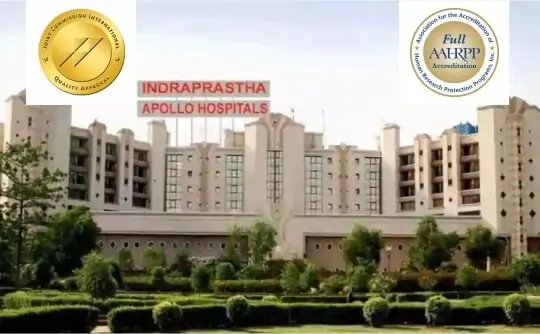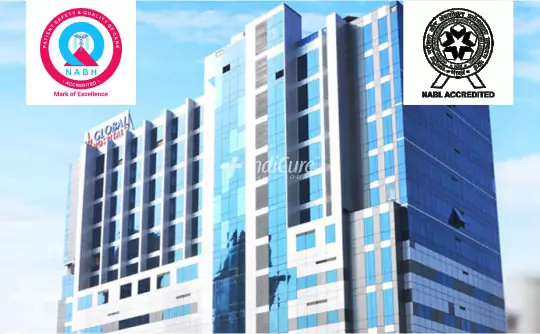

Gallbladder Surgery Cost in India starts from US $2,000 and varies depending on the technique used, your medical history and health condition, surgeon, hospital and the city where you choose to get the surgery done.
The most important factor that affects gallbladder surgery is the technique used to perform the surgery. So, wthere you need an open surgery or a Laparoscopic gallbladder removal surgery determine the overall cost. For example, while cholecystectomy cost starts from US $2000 in India, the Laparoscopic gallbladder surgery cost in India may start from US$2900.
An important expense when it comes to your gall bladder stone operation is going to be your gastrointestinal surgeon's fees. IndiCure recommends only experienced, skilled, board-certified surgeons who are capable of delivering successful gallbladder removal operations. The charges may vary depending on the experience of the surgeon, popularity, and the approach to treatment.
Having your gallbladder stone operation in an accredited surgical facility by skilled and qualified medical staff is a critical factor. Moreover, the geographical location of this facility also affects the quote. But, IndiCure provides you with a projected estimate that will be all inclusive and affordable.
The surgery-related expenses include the pre- and post-surgical expenses. The pre-surgical expenses are associated with the candidacy and the medical history of the patient. This also includes the routine medical exams and tests to ensure you're a good fit for the surgery. Post-surgical expenses may include prescription medications and follow-up consultations.
We at IndiCure, understand that you travel with a budget in mind and do not like to be greeted by surprises after arrival in India. We thus club all these expenses and give you the package cost that is inclusive and affordable at the same time.
Your case manager shall give you an estimated cost of your surgery after discussing your medical reports with the surgeon. The final cost, however, shall be confirmed after your consultation with the surgeon.
In fact, we have Special Negotiated Rates with the Hospitals and you can avail Discounted Rates when you choose to Travel with IndiCure.


We Help you Choose the Right Treatment, Surgeon & Hospital

We Arrange Video/Telephonic Consultation with the Surgeon

We Assist you with Visa & Accommodation

We Receive you at the Airport and Drop you at Hotel/Hospital

We Assist you the at Hospital & Provide Post Operative Support

New Delhi
Indraprastha Apollo Hospitals, New Delhi is a state of the art multi speciality tertiary-care hospital situated in the most posh area of South Delhi. Considered to be the flagship hospital of Apollo group, Indraprastha Apollo Hospital is one of the important landmarks not only in Delhi, but in the world map because of its popularity among the medical tourists.

Mumbai
Gleneagles Global hospital in Parel, Mumbai is a 450 bedded multi super-specialty tertiary care hospital housed on 17 floors. It is the latest addition to the geographical footprints of the Gleneagles group in India. The unique feature of the hospital is separate Intensive Care Units for separate specialties viz Post Transplant ICU, Medical ICU, Cardiac ICU, Surgical ICU, Renal ICU.
Gallbladder is the small pear-shaped sac-like organ present under the liver that collects the bile (digestive juice) manufactured by the liver. This bile is then released from the gall bladder as and when required which helps in breakdown of the dietary fats thus assisting in digestion.
Gallbladder stones are the most common problem of the digestive system and affect a large percentage of the population. Around 15% of the people above the age 50 years are known to suffer from gallbladder stones. More common in females and overweight individuals, gallstones are the small biliary calculi that are formed by cholesterol, bile pigments or calcium salts. Gallstones are formed when there is excessive cholesterol in the bile, the crystallization of which results in incomplete emptying of the gallbladder.
Most often, gallstones do not cause any symptoms and go unnoticed. However, if they do, the common symptoms include:
However, complications like blocking of the duct due to large stones, infections or pancreatitis may need quick treatment and surgery.
Gall bladder stones are easy to diagnose. The doctor may look for jaundice and get the blood tests done. Ultrasound is a convenient and quick way to get the gallstones detected. There are other complicated tests like ERCP if the doctor suspects stones in the bile duct.
The exact cause of developing gallstones is uncertain. However, gallstones may be formed due to one of the following reasons:
A cholecystectomy is a surgical surgery that removes your gallbladder. A cholecystectomy is a fairly common procedure that has a low chance of complications. You can usually return home the same day as your cholecystectomy.
The procedure can be done either through open surgery or laparoscopically.
During laparoscopic cholecystectomy, a tiny video camera and special surgical equipment are inserted through four small incisions into your belly to see into your abdomen and remove the gallbladder.
In some circumstances, the gallbladder can be removed by a single big incision. The procedure is known as an open cholecystectomy.
If you are diagnosed with gallstones and suffering from severe pain, if the size of the stones is more than 1 cm, or if your gallbladder is inflamed causing cholecystitis and is impairing your day to day life, you may require surgical intervention to remove the gallbladder (cholecystectomy).
Your doctor may also recommend a cholecystectomy (gallbladder removal) if you have:
The gallstones can be symptomatic or asymptomatic. Asymptomatic gallstones, or the gallstones which do not cause any symptoms, do not need any medical intervention. But the surgeons would advise you to remove the gallbladder if you are prone to develop complications of gallstones.
Following are the treatment options that highly depend on the size and site of the stones:
The surgical interventions for removal of gallbladder include:
We at IndiCure completely understand your concerns and it is always our endeavor to provide the best outcome for every patient. Following is the list of questions you must ask before you embark on your journey for gallbladder removal surgery in India.
Prepare to answer questions about your:

There are two main ways of performing gallbladder removal surgery (cholecystectomy):
The surgeon begins by making a few small incisions of about 0.5-1 cm in the skin of your abdomen to let the surgical instruments reach the abdominal cavity. Then a tube is inserted which blows a mild stream of CO2 which aids in separation of the abdominal wall from the underlying organs.
Also, the small camera which is attached to the laparoscope is put inside through one of the incisions for the surgeon to see the gallbladder on the monitor. Specialized X-rays called cholangiograms might be used to look for the wedges of the gall stones in the duct.
Then the biliary ducts and the artery supplying blood to the gallbladder are clipped and the gall bladder is cut using either laser or electrocautery which is then pulled out of the body via one of the small incisions in the abdomen. The instruments are then removed from the abdomen and incisions are sutures and dressed.
The entire procedure for open surgery is the same as the laparoscopic cholecystectomy except the fact that the surgeon removes the gallbladder by making a single and large incision in the abdominal wall.
Both the procedures are done under general anesthesia, which means you will be asleep during the procedure and will not feel any pain.
You can expect progressive recovery following the surgery. You get discharged from the hospital and go home the next day after the laparoscopic surgery while open surgery requires admission for 3-4 days. Most of the patients after laparoscopic surgery can resume their daily activities within a week's time. However, patients undergoing open surgery might need around 2-4 weeks to resume their routine activities.
Laparoscopic gallbladder surgery is quite safe and effective and gets rid of the gallstones located in the gallbladder. The results of the surgery are permanent and you would be relieved of pain you had before the surgery.
After a cholecystectomy, the majority of people will not have any digestive issues. The gallbladder isn't required for proper digestion. Following the operation, some people may experience occasional loose stool, which usually goes away with time. Any changes in your bowel habits or new symptoms after your procedure should be discussed with your doctor.
A cholecystectomy is a procedure that removes the gallbladder. Most doctors will not rush into this procedure. Even though it's a frequent procedure, it's still a big procedure with significant risks and complications.
You'll normally have to stay in the hospital for 3 to 5 days after open surgery, and your recuperation period will be longer. Returning to normal activities can take 3 to 4 weeks, and 6 to 8 weeks if you have more manual work. However, recovery shall be quicker in case of laparoscopic gallbladder surgery. Your stay at the hospital shall be for 1-2 days and you can get back to work after 1 to 2 weeks.
Yes, certainly. You can live a perfectly normal life even without a gallbladder.
Your liver will still produce enough bile to break down your food, but it will trickle continually into your digestive tract rather than being stored in the gallbladder.
You may have been instructed to follow a specific diet prior to surgery, but you are not required to do so thereafter. Instead, you should strive for a healthy, well-balanced diet.
After surgery, some patients may feel bloating or diarrhoea, but this normally goes away after a few weeks. You may want to avoid specific foods or drinks in the future if you discover they cause these symptoms.
Gallbladder removal is a fairly safe surgery with minimal risks and chances of complications. But like any other surgery, gallbladder removal surgery also carries some risks like wound infection, bile leaking into the tummy, damage to one of the openings (ducts) carrying bile out of the liver and blood clots.
The surgery is done under general anesthesia, so there will not be any pain during the procedure. When you wake up, you will have only minor discomfort. The abdomen, as well as the minor incision sites, will be uncomfortable, and some patients will experience shoulder ache for the first few days. Gas remaining in your abdomen during the operation causes shoulder ache.
Weight loss is frequent in the days leading up to and following gallbladder removal. Prior to the procedure, the doctor will advise you to eat a low-fat diet. Loss of appetite, nausea, and diarrhoea are all possible adverse effects right after the treatment. After surgery, however, it is critical to return to a regular, healthy diet.
If you've had several attacks, most doctors will advise surgery. If you've already had one gallstone attack, you might want to wait to see if you have any more. The best approach to avoid gallstone attacks is to have surgery. Because the operation is so popular, doctors are highly familiar with it.
No, the gallbladder does not regenerate. When it is removed, however, a duct or tube that drains bile from the liver to the gut is left behind.
Traveling abroad for medical reasons can be challenging if you are alone, but with IndiCure by your side, it doesn't have to be. With over fifteen years of experience and an exclusively curated network of India's best surgeons and top hospitals, we make your medical tour to India easier and safer. We will guide you at every step, handling all the end-to-end arrangements for your surgery, travel, and stay.
Ramandeep Dhaliwal
a month ago
I had great experience having rhinoplasty through Indicure. Dr. Ruchika from Indicure has helped me in finding best plastic surgeon, answering all my questions...
Ramandeep Dhaliwal's Full Review
Joshua Archer
3 months ago
My name is Joshua Archer I'm from New Zealand, bay of plenty, kawerau I opted for the bypass surgery in January 2023 but planned it in advance for 28 September found IndiCure...
Joshua Archer's Full Review
Kera Ren
8 months ago
Absolutely loved my experience with IndiCure - from first inquiring to meeting the surgeon pre op to my follow up post op. The surgeon was extremely approachable...
Kera Ren's Full Review
Andreana Paul
5 months ago
Had a wonderful experience. Visited India for my plastic surgery. From sending mails, airport pickup, comfortable accommodation and, to smooth hospital appointment booking...
Andreana Paul's Full Review
Brandi Luce
5 months ago
I had the privilege of using Indicure's services for a cosmetic procedure that I had wanted for a long time but had always been apprehensive about. Ruchika helped me...
Brandi Luce's Full Review
Jade M
3 years ago
Indicure Health Tours went above and beyond my expectations. They helped me with every aspect of my journey and were professional, kind and caring. I was...
Jade M's Full Review
The content on the website (www.indicure.com) is intended to be general information and is provided only as a service. All photographs on our website of before and after results are examples only, and do not constitute an implied or any other kind of certainty for the result of surgery.
Learn about IndiCure Health Tours' comprehensive editorial policy that strives to deliver trustworthy, helpful, relevant, accurate and people-first content on medical tourism in India.
It is not medical advice and should not be taken as medical advice. It should not be used to diagnose or treat a health condition and is in no way meant to be a substitute for professional medical care. You are advised to see a surgeon in person to assess what surgery may or may not accomplish for you.
It is also important to keep your expectations realistic and to understand that all surgical procedures carry risks and should never be taken lightly.